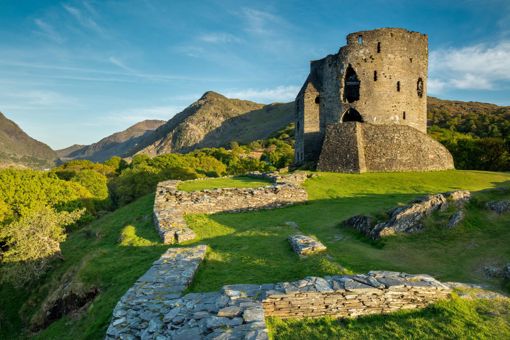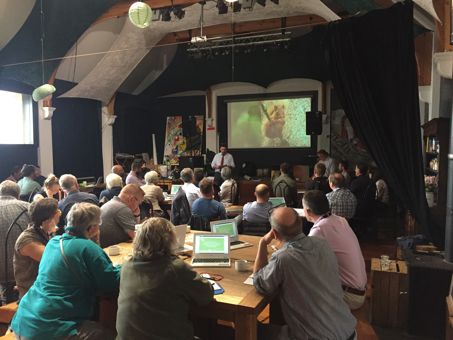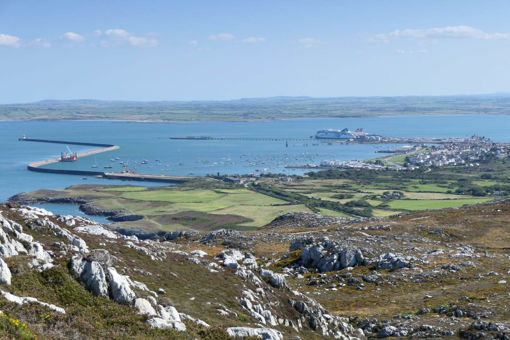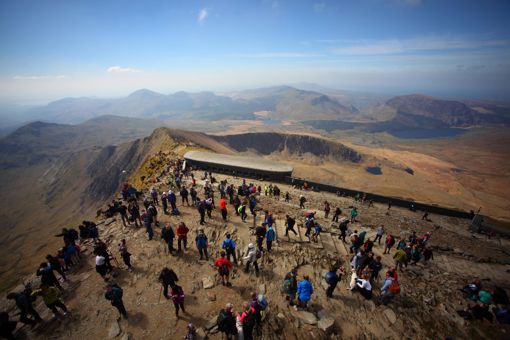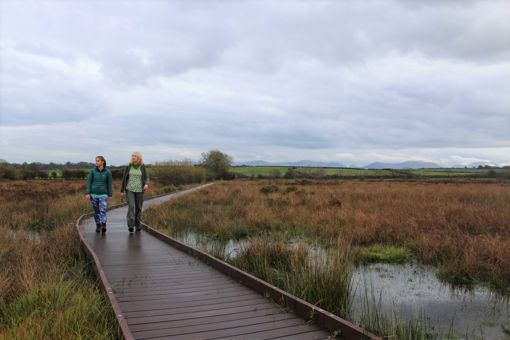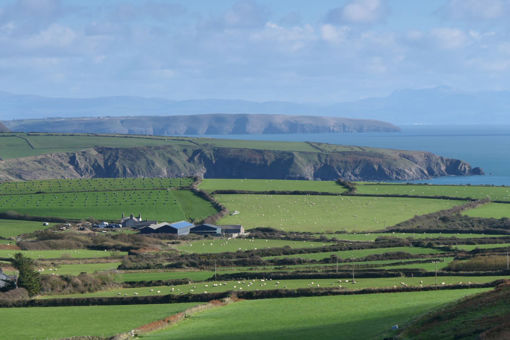Climate and environment emergency – adaptation and mitigation
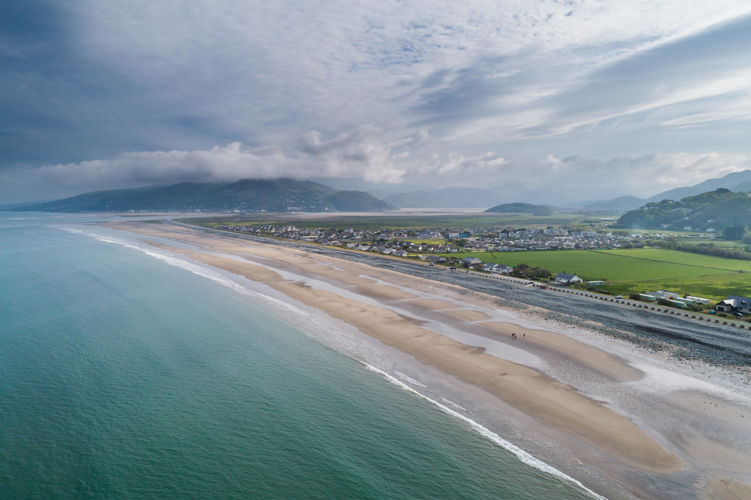
Climate and environment emergency
There are two key strands to addressing climate change:
- Reducing emissions and preserving carbon stores (known as mitigation)
- Responding to the present and future impacts of unavoidable climate change resulting from previous emissions (known as adaptation)
Over the last century, temperatures have increased, sea levels have risen, and weather patterns have drastically changed. With these changes projected to continue and intensify over the coming decades, we must collaborate to tackle the impacts and prepare to mitigate for all climate change possibilities.
No matter what we do to manage Wales' natural resources, things are going to change and Natural Resources Wales needs to work with stakeholders and partners alike and prepare for the changes that will affect their resilience.
Locally, we need to work together to ensure that the other themes in the Area Statement help mitigate against the impacts from the climate and nature emergencies, particularly:
- Considering how a resilient environment can support the most susceptible communities, people, species, habitats, businesses
- How we can empower and increase this resilience
- How we can change our behaviours to reduce carbon use and waste
Regionally, and nationally, we need to ignore boundaries and work together to plan for and tackle future emergencies. Natural Resources Wales (NRW) has already started with our Area Statement neighbours in the North East Wales by working together to support the work that the Public Service Boards across North Wales are doing by adopting a regional approach to climate change mitigation.
Through a collaborative approach, we can better improve and enhance the region, making it more sustainable for our future generations. This also means ensuring the other themes in the North West Area Statement also put in measures to get prepared, improve infrastructure and build adaptive and resilient communities living and working in harmony with our natural environment, ensuring our society is fit for the future.
While collaborative working will reduce greenhouse gas emissions limiting future climate change, much of the damage is already done. This is especially pressing as the North West Wales region consists of 45.5 per cent of the total length of the Welsh coastline. Coastal communities like Fairbourne in South Gwynedd face the stark impacts of climate change.
Moreover, climate change also impacts North West Wales through severe drought, increased frequency of wild fires and stress our native wildlife and natural habitats. As such, it’s important for us to review current evidence on the impact of climate change on our natural resources and share knowledge and understanding of the severity of the situation with our communities.

Why this theme?
To facilitate the development of the Area Statement, Natural Resources Wales (NRW) held 3 workshops in North West Wales during July 2019 including a session for staff. Based on these discussions, it is clear there is support amongst stakeholders that climate change is the prime theme among stakeholders. The developed themes were taken back to the stakeholders for validation at our second round of engagement workshops in November and December 2019. More information and detail on this can be found in the Introduction to the Area Statement and in the Ways of working theme.
To inform this theme we have considered:
- Local knowledge from a series of structured independently facilitated workshops across North West Wales
- The priorities set out in policy documents including Natural Resources Policy; Delivering Nature-Based Solutions, Increasing Renewable Energy and Resource Efficiency, Taking a Place-Based Approach
- Information from the State of Natural Resources Report (SoNaRR) on ecosystems and their resilience, and the risks to the benefits they provide
- The well-being assessments and plans, and the priorities that are emerging through Gwynedd and Anglesey and Conwy and Denbighshire Public Service Boards’
Issues identified by stakeholders:
The issues and opportunities sections reflect comments made during the engagement events. Natural Resources Wales noted that stakeholders questioned whether the North Wales Area Statement process, and all public services, were taking the climate and nature emergencies seriously enough. The comments below reflect the interest shown during the engagement to discuss and determine opportunities for tackling climate change impacts on the region.
- As a result of climate change, rising sea levels will affect vulnerable communities along the coast in North West Wales. It’s important to make communities more resilient to be able to adapt to an ever-changing climate including considering nature-based solutions
- A warming climate has the potential to improve growing conditions for Wales' farmers but can significantly impact on rare species
- Often very productive agricultural land is on the coast or on the banks of rivers which could be lost or impacted due to flooding or sea level, in turn due to climate change
- Impact on wildlife and recreation sites such as Newborough where recent storms have started to take away car parks
- Climate change isn’t just an environmental issue, it is social and will affect people and communities
- People’s expectations and demands on what needs to be achieved are increasing, but resources for delivery are potentially decreasing
- There may be a demand for water as a result of dry spells and drought
- Threat of wildfires due to dry spells and drought
- With a pressure on water resources, there may be an increase in competition for water between households, agriculture, industry and the needs of the natural environment
- Damaging impacts on woodlands due to pests and disease resulting from climate change, such as ash dieback
- Increase in carbon emissions will impact public health and well-being
- An increase in rainfall intensity will present challenges for drainage systems
- If coastal plants and wildlife cannot move inland, rising sea levels and increased land erosion could lead to species extinction
Opportunities identified related to this theme:
We will expand on these opportunities, including locations and detail as we develop theme groups to take the next steps with this Area Statement. All of the opportunities identified below will only be supported at environmentally appropriate locations.
- Using nature-based solutions to tackle climate change, such as improving management of forests and peatlands to increase greater storage of carbon and water
- Working collectively with partners using a singular message e.g. Welsh Water are going into schools talking about responsible use of water. NRW could join up with those promoting biodiversity and those wanting to reduce climate change
- Tap into natural flood risk management to reduce the risk of flooding and coastal erosion to areas across the North West
- Being more energy efficient using renewable energy where possible, like wind and tidal, supporting community energy groups
- To increase education and awareness on climate change encouraging individual action
- Create an action plan in North Wales to mitigate the declared climate change emergency
- The creation of a smart infrastructure for electric and hydrogen vehicles transitioning to a low carbon public transport system, one that is accessible to all and contributes to liveable, sustainable communities and could have significant impact on public health as well as on the environment
- Encourage more participation in car sharing and public transport to help in reducing carbon emissions
- Supporting local farms and food producers to reduce food miles and carbon emissions, while benefitting local workforce and land management
- The development of a single point of information that communities can access, creating a simple way to communicate with them. We want our most vulnerable communities to feel empowered and resilient when working to minimise the risks of climate change
- Reducing waste, encouraging re-use of materials and supporting recycling and composting across businesses and households, reducing methane emissions from landfills as a result
- There are opportunities for agriculture sectors to become more resilient and sustainable through planting deeply rooted leys creating better drought resistance and carbon capture
- To support flood defences there is an opportunity to build softer approaches that encourage natural flood management techniques, including: restoring degraded peatland, tree planting in the uplands and reinstating hedgerows. These techniques will not only minimise flood risk but will support biodiversity conservation and habitat connectivity
- Climate regulation through the restoration of more natural river morphology will help to make fish and invertebrate habitats more resilient to impacts of climate change
- We need to ensure that we leave space for biodiversity to adapt to climate change as the number and range of invasive non-native species is likely to increase
- Greater opportunity for tree planting to reduce carbon emissions and increase greater green space
- Being more energy efficient, using renewable energy and natural assets where possible, such as wind and tidal, supporting community power companies
- Greater transparency from businesses on energy usage
- Developing a partnership that will work together to plan how we can make large infrastructure like roads and railways, and developments like caravan sites near the coast more resilient and sustainable
- Communities need an opportunity to discuss and voice issues locally and be involved in the decision-making process
- Explore the potential for building community cohesion and grassroots action, policy initiatives, and running training and education programmes to support community resilience to climate change
- We should all lead the way in North Wales in demonstrating how we can mitigate and adapt to climate change

What would success look like?
- A well-informed population in Northwest Wales living sustainably in the area, sourcing local produce and food and utilising sustainable transportation. Everyone will be educated on the connection between consumption and climate change
- Active collaboration with public services developing options identified under the NRW Carbon Positive Project
- Supporting the Welsh Government to meet its target of net zero carbon emissions for 2050
- The region to become climate resilient and known for its clean, quality and biodiverse-rich environment, including the sea and water
- Working collaboratively across North Wales to share this cross-cutting agenda, placing the people of North Wales at the heart and forefront of decision-making
- Wales' inclusive and sustainable economy is flexible, adaptable and responsive to a changing climate
- Wales' natural environment is valued, enjoyed, protected and enhanced, with increased resilience to climate change
- Climate change is considered on every planning application. For example, planning authorities in Snowdonia National Park and local authorities undertaking methods when approaching climate change
- For private, public and third sectors to collaborate and work together to mitigate climate change
- Other partners such as Extinction rebellion are brought into the discussions to help
Benefits
There is a need to tackle climate change for our future generations that will inherit a world shaped by our actions today.
We need to ensure that we give children a platform to speak up about their concerns.
Who have we worked with to date?
- Invitations were sent to over 450 people and over the three workshops held, 100 people attended and contributed to the discussions. Natural Resources Wales (NRW) has developed the theme at those events and have been trying different ways to communicate with stakeholders to encourage continued involvement and interest in the local Area Statement
- A second round of workshops were held between November and December 2019 to build on previous discussions. We have also spoken with partners and listened to their thoughts and feedback, including National Parks Authority meetings, Farmers Union meetings and PSB workshops to help develop the content of the themes.
- Over 500 invites went out for the second round of workshops in November and December 2019 with over 100 people in attendance.
- A series of online workshops were held in November and December 2020 where further discussions were focussed around each theme.
Key points from assessment of data and evidence:
Global greenhouse gas emissions are at levels unprecedented in at least the last 800,000 years. The Intergovernmental Panel on Climate Change warned that the world must reach global net-zero greenhouse gas emissions by 2050 to avoid the consequences of warming above 1.5 degrees. Staying within these limits - which is still possible - will reduce risks to biodiversity, ecosystems, food systems, water and human well-being. When the report was published it led to a change in public perception of climate change. There is now an urgent need for a response across government and society.
The whole coast of the North West Wales Area Statement has been assessed by the Shoreline Management Plan. It has been developed by coastal groups to facilitate development of sustainable flood and coastal erosion risk management policies over the next 100 years, reducing the risks to people and the developed, historic and natural environments. The plan contains a range of policies for the coastline, which are ‘hold the line’, ‘no active intervention’ or ‘managed realignment’, per policy epoch. The policy epochs are up to 2025, 2026 to 2055 and 2056 to 2105.
What are the next steps?
We will develop the area wide vision for this theme with stakeholders– with a broad remit and wide representation. We will identify potential partners and interested individuals/groups, gaps in knowledge and linkages with local strategies and action plans, such as Local Development Plans, National Park and AONB Plans, Public Service Board Well-Being Assessments and Rights of Way Improvement Plans.
We will use the information gathered during the stakeholder engagement events (external, internal, with partners such as the National Parks Authority) to guide the activities and influence organisational plans.
For each theme we will need to review what information and data we have so far, plan who we talk to next, look for theories of change, identify barriers and how to overcome and explore opportunities for appropriate action. The Area Statement will be iterative and will change and evolve over time. Groups will be responsible for determining when plans need to change and who needs to be involved in that process.
From this will be able to engage with and enthuse a broader group of stakeholders beyond the wider environmental sector in a targeted way and with a stronger focus on involving and engaging local groups and individuals. This could mean a variety of approaches, including: social media, traditional media, community meetings, drop-in sessions and the strengths of our partners so that we’re all working together to deliver the Area Statement vision and ambitions.
How does what we’ve proposed deliver Sustainable Management of Natural Resources (SMNR)?
Working with the agriculture community to promote river corridor fencing and tree planting to help stabilise riverbanks will help reduce bank erosion and will contribute to natural flood risk management. Similarly, working with the agriculture sector on resilient farming practices, such as deeper rooting grass leys and other drought resistant solutions, will help the industry adapt to climate seasonal variations.
Managing pressures on water resources due to climate change through natural processes, for example increasing tree cover and fencing of riverbanks, will result in improved connectivity for species supporting habitat and wildlife resilience. Using nature-based solutions to tackle climate change, such as improving woodland cover and peatland restoration (ditch blocking to rewet peatland bog habitats), can lead to increased storage of carbon and water, contributing to natural flood risk management through the regulation of waterflow.
As such, encouraging local supply chains from farmland food production to fork, will contribute to a reduction in food miles and carbon emissions as a result. Moreover, improved greener transport networks and infrastructure will help reduce pollution, including noise pollution, and will positively contribute to improved air quality.
Offers the opportunities to work together to sustainably look int the greater use of natural assets for greener energy generations also contributes to reduction in the use of fossil fuels.
Working across sectors to define climate change adaptation and mitigation solutions suitable for Northwest Wales will help build sustainability and resilience. Working collaboratively with Public Service Board partners to research managing a regional approach to climate change will ensure a consistent and more effective approach.

How can people get involved?
We welcome opportunities for the public to engage with us at any stage of the Area Statement process.
There is also a feedback form and an Email address: northwest.as@cyfoethnaturiolcymru.gov.uk should you wish to write to us with your ideas for developing action under this Theme.
To help as the facilitators of this process, NRW will:
- Work on certain aspects of the conversations that came out of the Area statement stakeholder engagement that identified opportunities and challenges to trial different approaches and develop new ways of working.
- Support the stakeholders with a peer learning programme to build process resilience and a local legacy into the Area Statement process right from the start
- Ensure resources are made available to create an identity for the North West Wales Area Statement, so that stakeholders and decision makers understand its purpose, impact and how to get involved
There is also a feedback form and an Email address: northwest.as@cyfoethnaturiolcymru.gov.uk should you wish to write to us with your ideas.

